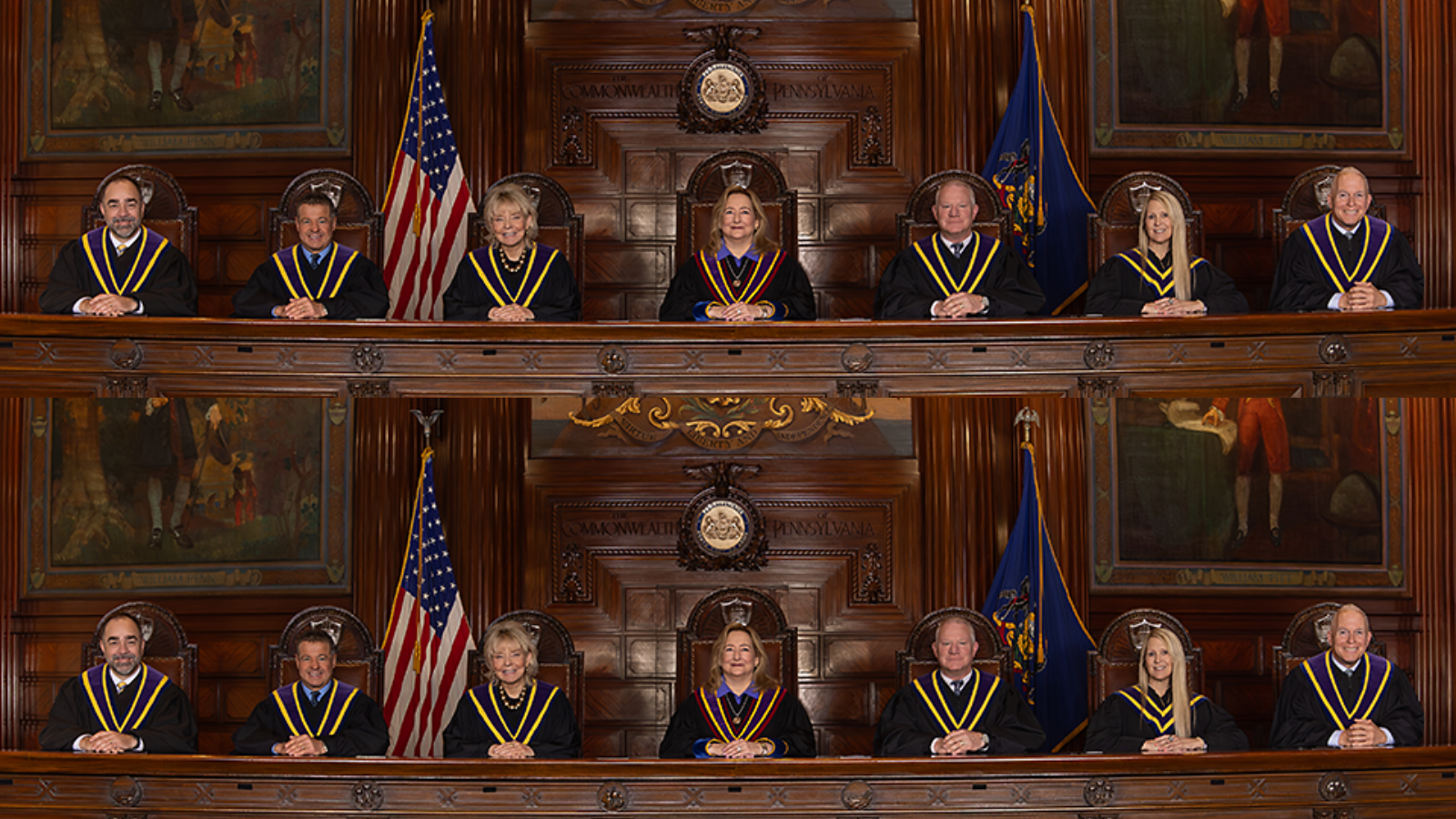Kevin Brobson (R), David N. Wecht (D), Christine Donohue (D), Chief Justice Debra Todd (D), Kevin M. Dougherty (D), Sallie Updyke Mundy (R) and Daniel D. McCaffery (D). (Courtesy of the Unified Judicial System of Pennsylvania)
Editor’s note: On Nov. 4, three Democratic justices on the state Supreme Court—Christine Donohue, Kevin Dougherty and David Wecht—face retention votes that could influence rulings on abortion, redistricting and voting rights for years to come. Democrats currently hold a 5-2 majority, but Republicans see an opening: If even one justice is voted out, the balance could shift, setting up a new partisan election in 2027.
The following analysis about the Pennsylvania election was excerpted from a brief by Alliance for Justice’s state court experts.
Why Pennsylvania Matters
The Pennsylvania Supreme Court hears cases affecting every aspect of your life during the year. The justices who sit on this court will determine your access to education, protections for workers in the workplace, LGBTQ+ civil rights and gender equality, whether your ballot will count during elections and whether and how the government protects the air you breathe, food you eat and water you drink.
With this power, the court can either ensure that state laws and state constitutional protections work for every person or subvert the rule of law in favor of an authoritarian government, the ultra-wealthy and powerful, and those who would exclude people from lives of self-governance and dignity.
Earlier this year, the court affirmed parental rights for LGBTQ+ families irrespective of partners’ gender, ruling to protect a lesbian mother’s parental status and affirming recognition of legal parentage for children conceived through assisted reproduction.
The court has also been essential in ensuring access to the ballot and that every Pennsylvanian is fairly represented in our democracy.
One of the court’s highest profile decisions was delivered in 2018. Republicans in the state legislature drew congressional maps that disrupted the previous partisan balance across state districts in favor of an extreme partisan gerrymander inappropriately favoring Republicans in 13 out of 18 total districts. The League of Women Voters and Democrat voters challenged the maps, and the Pennsylvania Supreme Court agreed to hear the case. The court found the maps to be an unconstitutional partisan gerrymander and ordered new ones. The Pennsylvania Supreme Court previously upheld Act 77, which permits no-excuse vote by mail for the first time in Pennsylvania history. This ruling is significant in the democracy and voting rights space, as approximately 40 percent of Pennsylvanians opted to vote by mail during the 2020 General Election. Pennsylvania’s highest court has also decided to revisit a case regarding the disqualification of mail-in ballots with incorrect or missing outer envelope dates that violate the state constitution. This case arises from the Republican National Committee appealing a Commonwealth Court decision that ordered the Philadelphia County Board of Elections to count rejected mail-in ballots from a September 2024 special election.
The court has been essential for strengthening worker protections and rights.
In 2015, the city of Pittsburgh passed an ordinance mandating that any employee that works at least 35 hours a week is entitled to sick leave. However, business owners and employers rushed to challenge the constitutionality of the law. The case eventually ended up before the Pennsylvania Supreme Court. In a win for workers in Pennsylvania, the court upheld the law. This was a huge step forward for the rights and dignity of all workers. The court has also stepped in to defend workers’ eligibility for and right to overtime pay.
The court has also upheld important protections for valuable natural resources across the commonwealth.
The court strengthened funding streams from oil and gas companies to natural conservation efforts. This was a significant win towards the protection of public lands and resources. In another decision, the court also increased transparency and accountability following toxic spills. The court found that companies were required to self-report when those companies were responsible for contaminating spills that affected the drinking water of both public and private land owners.
These are just a few cases demonstrating the outsized impact the court can have on your most fundamental rights and constitutional protections.
How to Weigh in on Your Supreme Court Important Dates to Remember Oct. 20, 2025 – Was the last day to register to vote. Learn how to register to vote here. Oct. 28, 2025 – Last day to request an absentee or mail-in ballot. Your request must be submitted and accepted by the county board of elections by 5 p.m. Nov. 4, 2025 – Election Day! Polls are open from 7 a.m. to 8 p.m. Your Voter Checklist
For more on the Pennsylvania Supreme Court, including selection method, a timeline of noteworthy cases, and more about the current justices on the court, head to AFJ’s original analysis.
The nonpartisan group guides.vote also released a comprehensive ‘cheat sheet’ breaking down the justices’ records and leanings on key issues—also recapped in this Ms. article, “Retention or Removal? How a Quiet Judicial Election Could Reshape Pennsylvania.”

